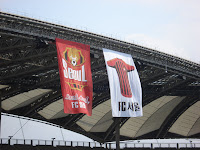 Yesterday, a group of us from Alphabet Street went on a tour of the DMZ. For those of you who are not familiar with what the DMZ is (i.e. if you live under a rock), it is the approximately 4km wide area between North and South Korea that contains the most heavily guarded border in the world.
Yesterday, a group of us from Alphabet Street went on a tour of the DMZ. For those of you who are not familiar with what the DMZ is (i.e. if you live under a rock), it is the approximately 4km wide area between North and South Korea that contains the most heavily guarded border in the world.Though there have been incidents in the past in the DMZ between the North and South (and the Americans), the area is pretty peaceful and I was never really scared at any time (plus, I doubt if there was an issue with security, they would not let two bus loads of tourists up to the demarcation line.
 We went to the Joint Security Area (JSA) which includes several buildings that cross between the two countries. We went inside one of these buildings and were allowed to go to the North Korean side of the building - thus, technically, I've been to North Korea. While in the JSA, we saw at least two North Korean soldiers, one even came within a few meters of us (see the first picture, that was taken from inside the meeting room, and that guy walked right up to the line with his binoculars).
We went to the Joint Security Area (JSA) which includes several buildings that cross between the two countries. We went inside one of these buildings and were allowed to go to the North Korean side of the building - thus, technically, I've been to North Korea. While in the JSA, we saw at least two North Korean soldiers, one even came within a few meters of us (see the first picture, that was taken from inside the meeting room, and that guy walked right up to the line with his binoculars).The big building (3rd pictures is North Korea and the border is halfway between the blue (UN) buildings. If you look really closely, you can see two North Koreans standing in the middle doorway and the doorway just left of the middle doorway.
 The other pictures are of Propaganda village (with one of the world's largest flagpoles and a massive flag - note the haze, visibility was not good), and of the Bridge of No Return. Pictures weren't allowed in many spots (and they wouldn't have been good with all the yellow dust).
The other pictures are of Propaganda village (with one of the world's largest flagpoles and a massive flag - note the haze, visibility was not good), and of the Bridge of No Return. Pictures weren't allowed in many spots (and they wouldn't have been good with all the yellow dust).All in all, it was a pretty interesting trip, despite the propaganda we were fed. Some other highlights of the trip included: the friendliness of the American Military tour guides (we had three and they were generally pretty nice and even cracked a few jokes), and the trip to the 3rd Tunnel. Unfortunately, we couldn't take pictures of the tunnel (it was pretty dark and cramped anyway) or of a few other things.
 For 44,000 won ($44) it was definitely worth the wait. The most eye opening fact about the trip was how quickly we got from Seoul to the DMZ. The distance is about 50 or 60km (3rd tunnel is 52km) and that would not give much warning time if something big happened. That being said, the border is extremely well defended by both the Americans and the South Koreans.
For 44,000 won ($44) it was definitely worth the wait. The most eye opening fact about the trip was how quickly we got from Seoul to the DMZ. The distance is about 50 or 60km (3rd tunnel is 52km) and that would not give much warning time if something big happened. That being said, the border is extremely well defended by both the Americans and the South Koreans.A sad addition to the trip were stories of families separated by the signing of the armistice who have not seen or heard from each other since 1953. We saw a short video of one reunion and it was pretty sad.
I would recommend this trip to anyone who comes to Seoul. FYI, we booked through USO, but I didn't do it, so I really can't help you out with that.















